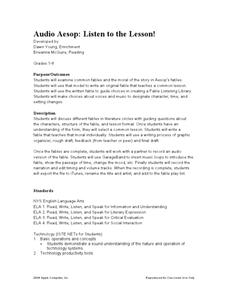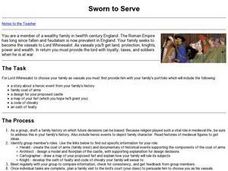Curated OER
Audio Aesop: Listen to the Lesson!
Aesop's Fables are the focus of this language arts instructional activity. Young philosophers study and discuss the morals found in the most famous of Aesop's Fables. They write an original fable that teaches a common moral. A "Fable...
Curated OER
Combining with Participial Phrases
Combine participial phrases and creative writing with this lesson, which is equally helpful for writing skills and conventions. After a mini-lesson on participial phrases and reading the picture book Dancing in the Wings, pupils use a...
Curated OER
So Much Depends Upon...Sixteen-Word Imagery Poems Inspired by Love that Dog by Sharon Creech
After reading Love That Dog by Sharon Creech (and possibly shedding a few tears), middle schoolers work on their own sixteen-word poems with a Six Trait writing activity. They focus on word choice in this activity to capture an...
Curated OER
Linking Writing to Creativity
In a GATE classroom, the key to producing creative writing is tapping into students' innate storytelling abilities.
Teach With Movies
Learning Guide To: Gone with the Wind
The film version of Gone with the Wind is the focus of this learning guide that asks viewers to consider some of the issues that the Southern states faced prior to and during the Civil War.
Curated OER
"Knot" the Whole Truth: Writing a Modern-Day Story with a Tall Tale's Voice
Beyond Paul Bunyan and his blue ox, tall tales can be a great way to teach young writers about word choice and voice in their writing. Using Jerry Spinelli's Maniac Magee and the Six-Trait Writing process, they begin to write their own...
Curated OER
Plot/Story Problem/Resolution
Students analyze the plot, problem, and resolution of a story. In this story analysis lesson, students read stories and fill out graphic organizers about the plot, story problems, and resolution.
Curated OER
Making Sense
Students use self-correcting strategies if they are stuck on a word in a simple sentence. In this reading lesson plan, students look at the covers of many books, and use the picture on the cover to help them figure out what the title...
Curated OER
Reader's Theater, Get Ready
Students recognize what features make a play. In this reader's theater lesson, students read the play Master Man: A Tall Tale of Nigeria told by Aaron Shepard and determine what features make this a play and what the author's purpose was.
Curated OER
Brainstorm This!
Students discuss the advantages and types of brainstorming as a prewriting tool. They experiment with different styles of brainstorming and produce prewriting samples for assessment.
Curated OER
Create a Story May
First graders review the terms characters, setting and events in stories. They are shown how to access the Kidspiration Map, and how to add pictures in the correct spaces on the map. Students insert pictures in the map of the story...
Curated OER
Sworn to Serve
Seventh graders explore the structure of the feudal system. In this world history lesson, 7th graders examine medieval history as they collaborate to prepare for a small group presentations regarding the feudal system.
Curated OER
Analyzing Irony in Nonfiction
Students examine the use of irony in non-fiction works. In this literature lesson, students read non-fiction war texts and explore the use of irony in the piece as they respond to discussion questions.
Curated OER
Still Life Predictions
Third graders read part of the story "Balto, the Dog Who Saved Nome". They make predictions about the story ending and identify the picture clues and textual information they used to form their predictions. They discuss the story's ending.















